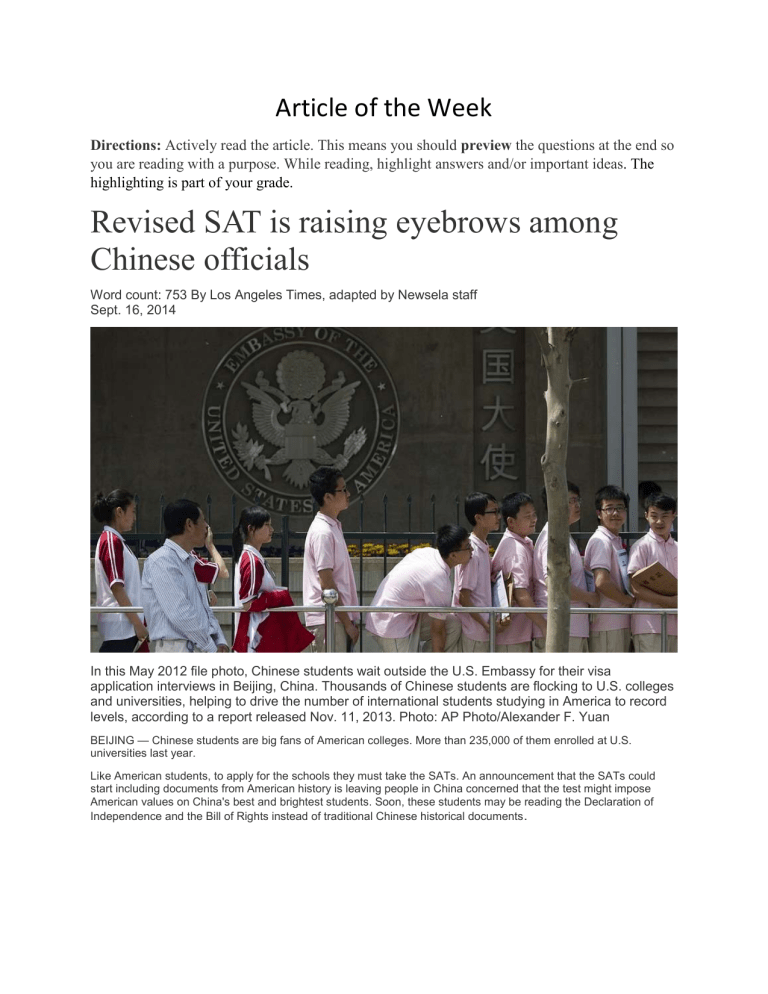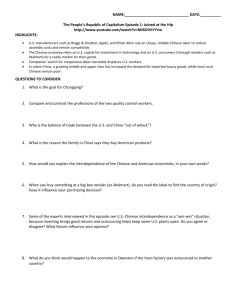Revised SAT is raising eyebrows among Chinese officials

Article of the Week
Directions: Actively read the article. This means you should preview the questions at the end so you are reading with a purpose. While reading, highlight answers and/or important ideas . The highlighting is part of your grade.
Revised SAT is raising eyebrows among
Chinese officials
Word count: 753 By Los Angeles Times, adapted by Newsela staff
Sept. 16, 2014
In this May 2012 file photo, Chinese students wait outside the U.S. Embassy for their visa application interviews in Beijing, China. Thousands of Chinese students are flocking to U.S. colleges and universities, helping to drive the number of international students studying in America to record levels, according to a report released Nov. 11, 2013. Photo: AP Photo/Alexander F. Yuan
BEIJING
— Chinese students are big fans of American colleges. More than 235,000 of them enrolled at U.S. universities last year.
Like American students, to apply for the schools they must take the SATs. An announcement that the SATs could start including documents from American history is leaving people in China concerned that the test might impose
American values on China's best and brightest students. Soon, these students may be reading the Declaration of
Independence and the Bill of Rights instead of traditional Chinese historical documents .
Political and Philosophical Differences
The U.S. College Board in March announced plans to redesign the SAT to include U.S. founding documents in one portion of the test, known as the Evidence-Based Reading and Writing. This will be one of several changes going into effect in spring 2016.
“Including content from America's founding documents in a revised U.S. college entry exam has drawn attention in
China,” China’s official New China News Agency said this week. The concern, the agency explained, is that the new content may spread American ideology. If students preparing for the SAT read the works of American thinkers, they may be more likely to agree with American points of view. This could make them less likely to agree with their own government.
The College Board acknowledges that the revised test will contain powerful ideas. Documents like the Bill of Rights include political and philosophical arguments that could influence students' values. The U.S. Constitution's First
Amendment, for example, discusses the rights of citizens to speak out against their government.
“The vital issues central to these documents — freedom, justice, and human dignity among them — have motivated numerous people in the United States and around the globe,” the College Board said in a statement.
Those are some of the values of which the Chinese Communist Party is suspicious. Many Chinese activists have tried to promote greater freedom in China only to have been silenced. In 2012, human rights activist Xu Zhiyong initiated the “New Citizens' Movement." The movement argued for greater civil rights for China's 1.3 billion citizens.
This January, Zhiyong was sent to prison for four years. Many believe that he was imprisoned because government leaders were afraid he was turning people against them.
Who Has Real Ideological Control?
1 The Chinese government's response to the SAT's changes follows a similar logic. The new SAT may influence
Chinese students in a way that their government dislikes. Writing in the South China Morning Post newspaper, Kelly
Yang argued that the new focus on civil liberties may “change the mindset and world view of an entire generation of
Chinese youth.” It is the threat of large-scale political influence that makes some Chinese leaders uncomfortable with the new test.
2 Some Chinese intellectuals, however, have argued that it is hypocritical for the government to point fingers at the
SAT. These critics have suggested that China's leaders should ease their ideological control on students rather than make accusations against a foreign exam. In other words, Chinese students are already influenced by political and ideological teaching. If the SAT is guilty of propaganda, so is China's government.
3 The Chinese Communist Party works hard to shape the beliefs and values of China's youth. Chinese students are required to take “thoughts and morals” lessons to study Communist ideology as early as first grade. In China’s college entrance exams, questions regarding core Communist theories such as Marxism and Maoism are essential to a student’s success.
Be More Free-Thinking
Zhang Ming, a political science professor at Renmin University, argues that the government should not worry about
American brainwashing and instead, it should allow students to think more freely. “I don’t think they have grounds to question what’s in the SAT before they cancel all the ‘political classes’ in Chinese schools,” he said.
Whatever its effects on students' beliefs, the SAT is likely to continue to be popular in China. In recent years, thanks to a booming economy, hundreds of thousands of Chinese families have sent their children to study in the United
States and other Western countries.
According to the Institute of International Education, the number of Chinese students at U.S. universities has grown
20 percent annually for over six years. Since 2010, China has sent more students to the United States each year than any other country.
Hoping to be admitted to prestigious American universities, many Chinese high school students will continue to take the SAT. Starting in spring 2016, this will mean that they will study some of America's founding documents, whether or not their government approves.
Name:_____________________
Period:_____________
1.
According to the article, which of the following is CORRECT?
A.
The Chinese government instead wants students to study about freedom and human dignity.
B.
There are plans to roll out a redesigned SAT starting next year.
C.
The Chinese Communist Party is neutral about the changes in the SAT.
D.
The revised SAT will include political and philosophical arguments.
2.
According to the article, why are so many Chinese students enrolling in American colleges?
A.
American colleges focus more on Evidence-Based Reading and Writing.
B.
American colleges have better infrastructure than Chinese colleges.
C.
Chinese students like studying about American history.
D.
Chinese students are admirers of American colleges.
3.
Select the sentence that DOES NOT support the central idea of the article.
A.
An announcement that the SATs could start including documents from American history is leaving people in China concerned that the test might impose American values on China's best and brightest students.
B.
The U.S. College Board in March announced plans to redesign the SAT to include U.S. founding documents in one portion of the test, known as the Evidence-Based Reading and Writing.
C.
The concern, the agency explained, is that the new content may spread American ideology.
D.
If students preparing for the SAT read the works of American thinkers, they may be more likely to agree with American points of view.
4.
Select the paragraph from the section "Who Has Real Ideological Control?" that describes the reason the Chinese government is against its students taking the SAT.
Paragraph #__________






